- Home
- Rudy Rucker
Million Mile Road Trip
Million Mile Road Trip Read online
Praise for Million Mile Road Trip
“Tipping his hat to Thomas Pynchon, Jack Kerouac, and Douglas Adams, Rucker immerses readers in a fantastical roadtrip adventure that’s a wild ride of unmitigated joy … Rucker populates this story with boldly surreal, humorous personalities and environments and moves it at a frenzied, ever-increasing pace … He ties everything together with internal consistency, playful use of language that keeps his ideas alien yet accessible, and a solid grounding in fourth-dimensional math. This wacky adventure is a geeky reader’s delight.” —Publishers Weekly
“Reading Rucker is watching an imagination that is absolutely unafraid of expanding without encumbrance…a pleasure fully indulgeable in Million Mile Road Trip. Rudy’s love affair with the literary road trip began with On the Road. And what a trip this new one is… full of incidents and detours and stops at surreal diners, just like any road trip. And at the end of it all, you arrive. You are there. You scan the horizon and find yourself somewhere you never imagined. A place, in this case, only Rudy Rucker has imagined.” —Marc Laidlaw
Million Mile
Road Trip
Rudy Rucker
Published May, 2019
Paperback & Hardback: Night Shade Books, New York
Ebook: Transreal Books, Los Gatos, California
www.rudyrucker.com/millionmileroadtrip
Million Mile Road Trip is
Copyright © Rudy Rucker 2019.
Hardback ISBN 9781597809917
Paperback ISBN 9781597809924
Ebook ISBN 9781940948393
The cover painting is Saucer Bagpipe by Rudy Rucker.
For My Grandchildren
1: First Kiss
ZOE
Zoe Snapp is a total outsider, unable to finish anything on time, and unwilling to work society’s games. She plays trumpet in her school’s jazz ensemble. She refuses to polish her trumpet—she likes tarnish. She wears hoodies, T-shirts, and jeans. She makes her own jewelry out of crystals and rubber bands. Her best pal is skinny Villy Antwerpen, who lives a block or two away from her. Villy has zero ambition and poor self-esteem. But he gets what Zoe’s about, and he’ll always listen to her, and maybe she has a crush on him.
Often Villy gives Zoe a ride home from school. Today’s not, strictly speaking, a school day—Zoe, Villy, and the other seniors just came for the afternoon to rehearse tomorrow’s graduation ceremony. They didn’t do the speeches, or the reading of the names, and they didn’t mess with the gowns, so it didn’t take long. And now, here they are in the parking lot, like the end of a regular school day.
Villy has an ’80s beater wagon. He’s pretty good at fixing things, but he has trouble with his math and science classes. Villy says he’s dumb, but that’s not exactly what it is. It’s more that he’s too practical. Too into the physical world. He can pretty much figure out the inner workings of any gadget you hand him. Even so, there’s still plenty of things wrong with his car. Because he’s not in his garage all that much. More likely he’s out surfing or riding his skateboard.
“All hail the purple whale,” says Zoe, settling onto the ancient car’s wide, bench-style front seat. She does a low laugh and shakes her dark hair. She wears it in a bob with bangs. And then she uses her lively eyes to shoot Villy a sideways glance which pretty much slays him, or at least that’s what she likes to think.
“I might start calling this car the puce whale,” says Villy. He has a straight mouth. When he smiles, it always starts with the corners. His hair is shades of blond—streaked from sun and surf. His tan skin is somehow salty-looking, in a good way.
“Puce?” says Zoe. She has a nicely shaped mouth, with precisely edged lips. She often makes faces while she’s talking—as if she’s miming a commentary on her words. That way, if she happens to say something uncool, the implicit irony gives her a fallback.
“Here’s puce,” says Villy and shows Zoe a colored patch on his phone’s screen. Brownish purple.
“Very like your whale,” says Zoe. “I always thought puce was a pukeful yellow-green.”
“A common error,” says Villy. He wiggles his dark eyebrows. He’s wearing skinny jeans and a dark green T-shirt with a squiggle on it. Well-worn items, frayed and with just-so holes. Accidental chic.
“You know a lot,” says Zoe.
“Anything I know I learned from games and comics and graphic novels,” says Villy. “School is a hoax. Years of useless brainwashing.” He has a low voice with a bit of a scratch in it. He’s nodding his head to his phone’s music.
“Graduation tomorrow!” exults Zoe. “I used to sit in class, looking out the window, and I’d envy the people outside doing things. Having lives. No teachers, no tests, and not being dissed by zerks like Tawna Garvey. At last we’ll be free.”
Villy’s looking at her. Zoe feels she’s too short and her breasts are nothing much. As for her butt, well, it’s wider and rounder than it was when she was eleven, and boys have been known to stare after her in the hallway, brain-dead sexists that they are. But when Villy looks at her, she’s glad. And she likes looking at him. He has these flowing surfer muscles. He’s never out of balance, always in the now. So unselfconscious, so male.
All these unspoken intense thoughts in Zoe’s head.
Villy starts the car. “I saw you arguing with Tawna before rehearsal today,” he says. “She and her friends were imitating you later on. Laughing like hyenas.”
“Really?” Zoe’s both annoyed and pleased. “Usually I can hardly tell if Tawna even hears me. She acts like I’m a tiny dog, way down at the limit of visibility. A barking ant.”
“Snobby about what?” says Villy, quoting. “That’s what you yelled at Tawna today. For no reason. Right out of the blue. Like a crazy person.” He laughs. His laugh is a weird high cackle. It’s another thing that Zoe likes about him.
“Right,” says Zoe with aplomb. “Snobby about what? Tawna’s dim, she wears mall-store cougar clothes, she talks like a duck. So why snobby?”
“She’s a suffering fellow clown,” says Villy with a shrug. “Crying on the inside.”
Villy has this annoying thing—at least Zoe thinks it’s annoying—he has this thing of identifying with people and understanding their feelings and empathizing with them. So boo-hoo.
“People take advantage of you because you’re nice,” she tells him.
Meanwhile Villy guides his unwieldy whale towards the exit of the high school parking lot. Kids are all around—carrying backpacks, working their phones, bopping to music. Overhead the seagulls swirl.
“Look up ahead!” exclaims Villy. “Tawna beckons. She wants me, Zoe. Because I’m too nice.” He guns his engine. A manly roar.
“Actually, she’s giving us the finger,” says Zoe. “Run her down.”
Villy gets with the program. He veers in a menacing way so that his purple whale wallows very close to the curb where Tawna stands amid her coterie of friends. Squeals and yells. Someone lands a thuddy kick on the whale’s rear fender. Villy honks and drives on.
“If we killed Tawna and I went to jail, at least I’d know what I’m doing this fall,” says Zoe, gazing back at her enemies. “What set me off before rehearsal was the sound of Tawna making happy plans for a mall spree to assemble her college duds. Quack, quack. Strutting duck.”
Los Perros Boulevard is crowded with seniors in their cars. Villy has some jagged surf music on the car speakers—it’s a recording of the garage-band trio that he plays bass for. It’s not a bad sound, although, in Zoe’s opinion, strictly as instruments, guitars are lesser than horns.
It’s the first week of June, and the misty blue sky is like a soap film. Palm trees line the wide street. Rats crawl up the palms and live in the dead fronds. Ha
zy forested foothills edge the scene. Homeless people live in caves up there. Maybe that’s Zoe’s fate.
“You need to get over being rejected by UC Berkeley,” Villy is saying to her. “And by those other two schools.” He seems genuinely concerned. “You haven’t even looked into community college, have you?”
“I keep waiting for Mom to goad me into doing it, but she’s crazy into being a realtor, and now she’s even set herself up as a college admissions coach. As if. She started in March, and she has five clients.”
“And you’re not one of them.”
“Mom nagged me for months to write my Berkeley application. The personal statement part. On the last possible day, I wrote that American life is a blockbuster movie with hiccup anthems, but I—I want a life that’s a flip-card cartoon with sqwonky horns.” Zoe smiles to herself and adopts a literary tone. “My mother grew incoherent. In tears, she cast me adrift. I savored the surcease of nag. In my heart, I knew the hipster admissions people at Berzerkely would fully understand. Like: ‘Yes! Zoe Snapp!’ I was so wrong. They wanted me to grunt an anthem. I’ll never fit in anywhere.”
“Tawna’s essay for Berkeley says she wants to tutor at-risk minority middle-schoolers and monitor the environment for hidden toxins in our food supply,” says Villy. “She showed it to me. Right before we did the deed on the padded bench in the weight room.”
“Not funny,” says Zoe, utterly dismissing this. “Speaking of desperados, my half-sister Maisie has really been craving attention this week. She’s like this touching, boyish Oliver Twist lassie who makes the best of a bad lot. A love child, borne by the foul, home-wrecking Sunny Weaver. With whom my dad lived for, yea, unto sixteen years.”
“Maisie has it hard,” says Villy. “She has that funny bulge around her waist. It’s not jiggly like fat. It’s like she carries a rolled-up towel under her blouse.”
“Maybe if I was closer to her, she’d explain herself,” says Zoe. “I can tell she wants to pour out her heart. She sends me selfies and calls me sistah. I’m an outsider, but Maisie—wow. I do sit next to her in jazz band practice, even though she’s a junior. If I didn’t at least do that, I’d have to douse myself with gasoline. Got a match?”
“Stop it with the death-wish routines, Zoe. You’re a better person than you admit. And some of us care about you.”
Villy is looking at her. His pale brown eyes. Zoe feels something in her chest unknot. All of a sudden she reaches over and runs her hand across Villy’s cheek. So close, so human, so real.
“Thanks,” goes Zoe. “Thanks for saying that.”
“Maisie plays trombone, right?” says Villy. Like he’s not sure what else to talk about right now. “I like trombones. Honking into the sky. Loss of control.”
“Maisie gets all impish and gleeful when she plays,” says Zoe, enjoying the fancy words. “She likes to bump me with the brass slide. Sistah! But she plays really well. She was teaching me a new riff after practice today—even though I wanted to edge away. And right then she gave me this really pretty pearl and I was like too stunned to really thank her. I don’t see how you can think I’m a good person.”
“Also, you’re hot,” says Villy. “I like your skin. Smooth and kind of dark. I always want to touch it.”
Zoe’s sitting there with a total goofball smile on her face. “You’re hot too,” she says. She’s completely not ironic, completely unprotected. It’s okay. It’s safe with Villy.
And now what? A silent interval ticks by.
“I never see Maisie on weekends,” Villy eventually says. “Never at a party. It’s like she leaves town.”
“I wonder about that too,” says Zoe. “I do know she’s into that flying saucer cult that meets in the community center. The New Eden Space Friends. Dad’s old group. He used to say there’s good saucers and bad saucers, and it’s up to us to help the good ones win. Why am I even talking about this?”
“It’s okay,” says Villy. “I like your voice. If we weren’t in California, maybe your father could have been a Baptist or a birdwatcher. Instead of becoming a vanished saucer nut.” Villy pauses, then restarts. “On the upside, if saucers are real, then it doesn’t matter if we go to college. Because the end of the world is nigh.”
“We’re in a vortex of madness,” declaims Zoe. “Living on borrowed time. Soon to lie beneath sad white stones in a grassy dell.”
“Death-wish alert,” chides Villy. “Nix, nix.”
“Reset. At least I’m still making jewelry.”
“At least I still surf.”
“Have you taken note of my necklace?” asks Zoe, doing a geeky nineteenth-century-talk thing. “I found some stretchy-strong plastic to use for the string. The color of the string is—puce. Yes. And the crystals are faceted so they shatter light into colors. You think they’re tinted, but they’re not.” Her voice catches, and her stream of chatter breaks. “Oh, Villy, what are we going to do with our lives?”
“You’ll make jewelry and wail on your horn. I’ll surf and work on my car. And sometimes we’ll drive around together and get food. Can’t that be enough?”
“Mom doesn’t think so. And I’ve reached a point where I physically can’t do anything she tells me to. It’s like I’m paralyzed.”
Villy makes a mystic pass with his fingers, as if awakening Zoe from a trance. “Arise! College or job! College or job!”
“I don’t want a low job,” says Zoe in a small voice. “Even if they think that’s all I deserve. A salesgirl behind a counter. Submissively helping rude idiots buy embarrassing medical aids.” She pokes at her phone. “I know there’s a registration page for Waste Valley Community College someplace online. All you need is to be a high school grad. But I keep delaying. Get it together, Zee. Do it now.”
“Me, I probably can’t even go to West Valley,” says Villy. “I’m failing math. I’m not graduating. I don’t know why I even went to the graduation rehearsal today. It would be bullshit for me to walk across the stage and not even get a diploma.”
“Oh Villy,” says Zoe in true sympathy. “I didn’t know. The grisly square root? The smelly log?”
“I always think I understand, but on the test I get a mental block. Also the teacher doesn’t like me.”
“Can you take math in summer school?”
“They have an online remedial course, but I don’t want to do it. Studying online is for robots. My father—he pours every day of his life down the toilet of his screen. I want to be the opposite. If I can’t graduate, maybe I should be a mechanic in a garage.”
“Would your father let you do that?”
“He’d think it was funny. He doesn’t care what people say. But—like you said—a job means regular work hours and a boss. Don’t want. Plan B? I’ll buy junker cars and fix them and sell them.”
Zoe is watching a seagull float along with the car, like it’s pacing them. The gull cruises over the town library, the minimart, the nail parlor, the Victorian mansions with flowering shrubs, the Route 17 overpass, the supermarket strip mall, and the flimsy old ranch houses that sell for two million dollars each, the gull guiding itself with feathertip flicks. Mindless. All-knowing. In the good old now.
“What if we two skip town?” Zoe suddenly says. “Like really soon.”
“And, lo, they journeyed in the belly of a whale,” intones Villy, doing an unctuous voiceover.
“I mean it,” says Zoe. “A massive road trip.”
Villy considers. “Well, okay, yeah, the brahs and I have used my purple whale for surfaris. Slept inside it with camping mats. You and I could roll across the country, sure. Why not? Drive on back roads. Sleep in haystacks. Trade cow chores for farmhouse breakfasts. Busk on sunset street corners. You’ll play your horn and I’ll juggle. Fully off the grid.”
“Yah, mon,” says Zoe, reggae style. “Maybe we hit Mexico for starters? I’ve never been there. I’ve never been anywhere but Los Perros and Santa Cruz and San Francisco and—gag—San Jose. Where Dad lived with Sunny Weaver.”<
br />
“I’ll bring a surfboard,” says Villy. “We’ll veer down the coast to Baja.” He likes veering.
“One thing,” says Zoe. “Would, ah, would this trip mean we’re officially hooked up? And you’d be my boyfriend?” Her voice is cautiously flat.
Long pause. “We don’t have to officially decide something like that, do we?” says Villy. “I’d rather drift into it.”
“We’re drifting and drifting and nothing happens,” says Zoe.
“I’d like something to happen,” admits Villy. His voice is husky. “But I can’t fully visualize how we get there.”
“Not that hard, Villy. Lots of people do it.” Zoe rolls seductive eyes his way.
Villy laughs nervously, and brushes his hair out of his face. “Talking to you about sex—if that’s what we’re talking about—it makes me feel like I’ve been skating on an easy sidewalk, but suddenly there’s a thousand-foot drop-off on either side, and the sidewalk has narrowed to a single-track trail, and pebbles are skittering off the edges and bouncing down the rocky cliffs, all the way down to the exploding sea.”
“I’ll call that a compliment,” says Zoe, laughing a little bit. “Or maybe not? Here’s my house, Villy. You’re about to drive right past it. Rattled much? Bouncing down the rocky cliffs. Will you give me a ride to the talent show tonight?”
The high school’s spring talent show is a night-before-graduation evening of wholesome fun. Not to be confused with the senior prom, by now a month in the past. And no, Zoe hadn’t gone. Due to hideous, self-sabotaging bungling, she ended up without a date, and she hadn’t been able to face the prom alone. She should have asked Villy. Whatever. At least she’s playing in the spring talent show, ta-da! Tonight’s show will include two numbers by the group Zoe’s in: the Los Perros Jazz Howlers. Does it matter? Her life is slipping away.
“Uh, sure I’ll give you a ride,” says Villy. “But—”
“We’ll talk more later.” And now, just when the boy thinks he’s safe, Zoe leans over and gives him the kiss that she’s been thinking about for weeks or even months. She means only to plant her lips on his cheek, but at the crucial moment he turns towards her, and she arrives at his mouth. Kissing for real. Their teeth click, their foreheads bump. Awkward, awkward. But then somehow it’s good. For a sweet long minute they linger. And then stop for breath. Enough for now.

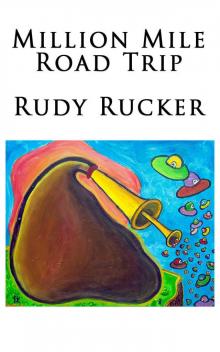 Million Mile Road Trip
Million Mile Road Trip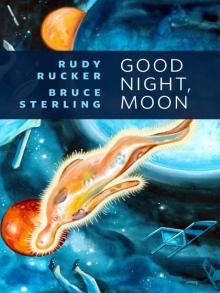 Good Night, Moon
Good Night, Moon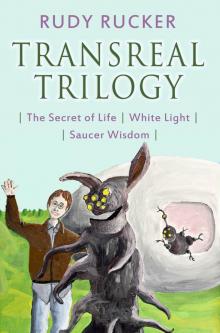 Transreal Trilogy: Secret of Life, White Light, Saucer Wisdom
Transreal Trilogy: Secret of Life, White Light, Saucer Wisdom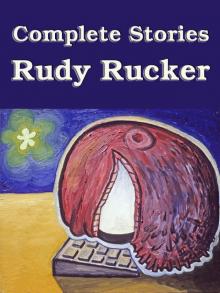 Complete Stories
Complete Stories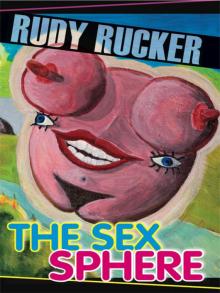 The Sex Sphere
The Sex Sphere Surfing the Gnarl
Surfing the Gnarl Software
Software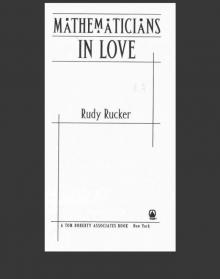 Mathematicians in Love
Mathematicians in Love Seek!: Selected Nonfiction
Seek!: Selected Nonfiction The Secret of Life
The Secret of Life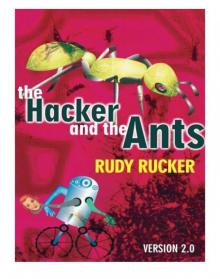 The Hacker and the Ants
The Hacker and the Ants Postsingular
Postsingular Spaceland
Spaceland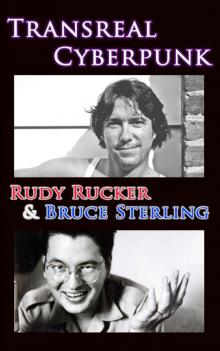 Transreal Cyberpunk
Transreal Cyberpunk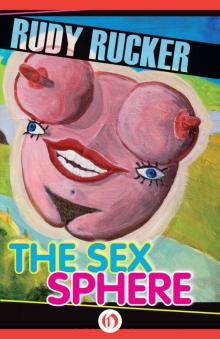 Sex Sphere
Sex Sphere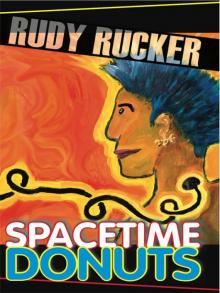 Spacetime Donuts
Spacetime Donuts Freeware
Freeware The Ware Tetralogy
The Ware Tetralogy Frek and the Elixir
Frek and the Elixir Junk DNA
Junk DNA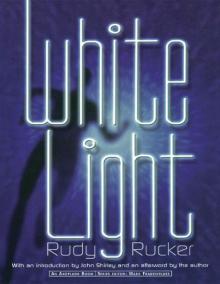 White Light (Axoplasm Books)
White Light (Axoplasm Books) Nested Scrolls
Nested Scrolls Inside Out
Inside Out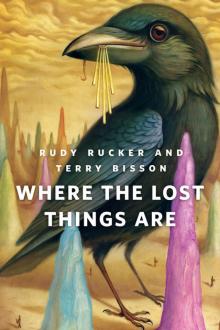 Where the Lost Things Are
Where the Lost Things Are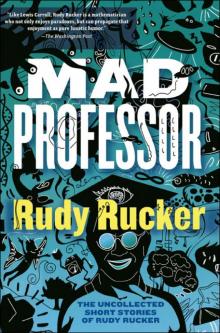 Mad Professor
Mad Professor As Above, So Below
As Above, So Below Realware
Realware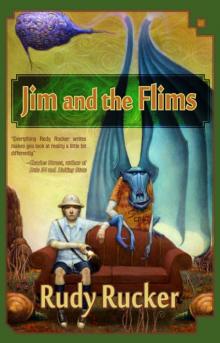 Jim and the Flims
Jim and the Flims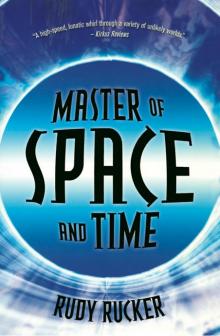 Master of Space and Time
Master of Space and Time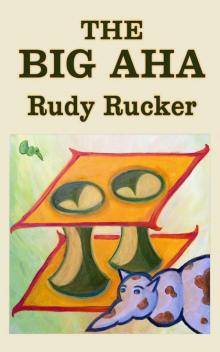 The Big Aha
The Big Aha Hylozoic
Hylozoic